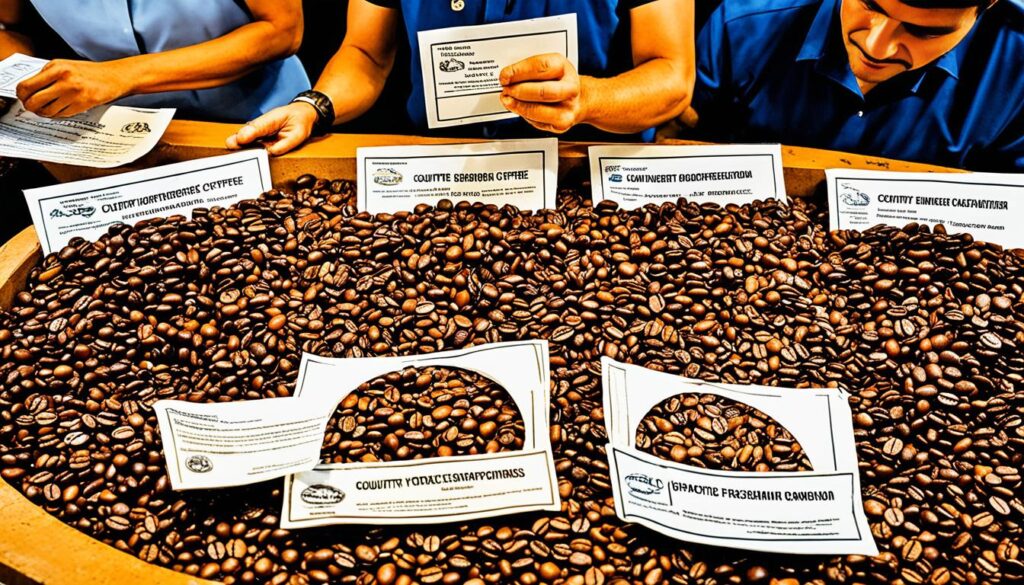Welcome to our comprehensive guide on the coffee loophole, a fascinating topic that has piqued the interest of many in the coffee industry. In this article, we will delve into what the coffee loophole is, explore the concept of coffee tax exemption, and discuss the relevant coffee import regulations. So, grab a cup of your favorite brew and let’s uncover the secrets behind the coffee loophole.
The coffee loophole refers to a legal opportunity for coffee importers to avoid paying customs duties on their imported coffee. By leveraging certain international trade laws and regulations, importers can navigate through the loopholes in the system to minimize their tax liabilities. This provides them with a way to reduce costs and increase profits.
Throughout this guide, we will dive deep into understanding the coffee loophole, exploring how it works, and discussing the pros and cons that come with its implementation. We will also examine the impact of the coffee loophole on the coffee industry and speculate about its future in light of evolving trade laws and regulations.
Moreover, we will provide useful insights and best practices for importers to effectively navigate the coffee loophole, while also considering the legal and ethical considerations surrounding tax avoidance strategies.
So, join us as we unravel the intriguing world of the coffee loophole and equip ourselves with the knowledge needed to make informed decisions in the ever-evolving coffee industry.
Understanding the Coffee Loophole
The coffee loophole is a legal strategy that allows coffee importers to avoid paying customs duties on their imported coffee. It involves exploiting various loopholes in international trade laws and regulations to minimize tax liabilities. While the specific details of the coffee loophole may vary depending on the country and its trade policies, the general concept is to take advantage of legal loopholes and tax avoidance strategies to reduce costs and increase profits. Importers who successfully navigate through the coffee loophole can save a substantial amount of money on customs duties.
Importers who understand and utilize the coffee loophole effectively can gain a competitive edge in the coffee industry. By avoiding customs duties, they can lower their costs and offer their products at more competitive prices. This can attract more customers and increase sales, ultimately driving business growth and profitability.
To better understand how the coffee loophole works, consider the following scenario:
Company XYZ, a coffee importer, discovers a legal loophole in the trade regulations of Country A. This loophole allows them to import coffee without paying customs duties. To qualify for the loophole, they must import coffee through a specific designated channel and meet certain documentation requirements. Company XYZ carefully structures their import transactions to meet these criteria, successfully taking advantage of the coffee loophole and minimizing their tax liabilities.
By exploiting the coffee loophole, Company XYZ can save a significant amount of money on customs duties, giving them a competitive advantage in the market. This allows them to offer their coffee at lower prices than their competitors, potentially attracting more customers and increasing their market share.
It is important to note that while the coffee loophole offers importers a legal way to minimize tax liabilities, it is crucial to navigate it responsibly and ethically. Importers should ensure that they comply with the laws and regulations of the countries involved and consult with legal and tax professionals to ensure their actions are within the boundaries of the law.
Legal Loopholes and Tax Avoidance Strategies
Understanding legal loopholes and tax avoidance strategies is essential for importers looking to take advantage of the coffee loophole. These strategies involve using legitimate methods and loopholes provided by the law to reduce tax liabilities. Some common tax avoidance strategies include:
- Utilizing tax incentives and exemptions provided by the government
- Structuring import transactions to minimize tax liabilities
- Establishing a presence in countries with favorable tax policies
- Utilizing tax-efficient transfer pricing mechanisms
- Engaging in strategic tax planning to optimize profitability
By implementing these strategies, importers can legally minimize their tax liabilities and maximize their profits. However, it is important to note that tax avoidance strategies must be compliant with the laws and regulations of the countries involved. Engaging in illegal tax evasion practices can result in severe penalties and legal consequences.
Image for Reference: Coffee Beans
https://www.youtube.com/watch?v=iUe6BqeINTE
How Does the Coffee Loophole Work?
The coffee loophole operates by taking advantage of the existing import regulations of coffee-producing countries. These regulations often include specific exemptions or deductions for certain types of coffee or designated import methods. Importers can exploit these loopholes by structuring their import transactions in a way that qualifies them for these exemptions or deductions.
For instance, a coffee importer may import their coffee through designated channels or utilize specific documentation that allows them to benefit from the tax loopholes. In some cases, importers need to meet certain criteria set by the coffee-producing country to qualify for the import regulations’ exemptions.
By carefully navigating through the importing rules and regulations, importers can effectively leverage the coffee loophole to reduce their tax liabilities and increase their profit margins. It requires a deep understanding of the specific rules for importing coffee and diligent compliance with the regulations.
“The coffee loophole allows importers to strategically structure their import transactions to legally minimize tax liabilities and optimize profits.”
Therefore, to take full advantage of the coffee loophole, coffee importers must stay informed about the importing rules and regulations of each coffee-producing country. By staying up-to-date with any changes in the regulations and seeking guidance from legal and tax professionals, importers can develop strategies that align with the coffee loophole while adhering to all legal requirements.
The Role of Importing Coffee Rules
Importing coffee rules serve as a framework that outlines the specific requirements, restrictions, and conditions for importing coffee into a country. These rules are designed to regulate the flow of coffee imports while promoting fair trade practices and protecting the interests of local coffee producers.
Understanding and complying with these importing rules is crucial for importers who wish to utilize the coffee loophole effectively. It ensures that their import transactions meet the necessary criteria and qualify for any applicable exemptions or deductions.
The Importance of Explained Tax Loopholes
Tax loopholes play a significant role in allowing importers to reduce their tax liabilities in a legal manner. By exploiting these loopholes, coffee importers can lower their costs and increase their profitability. However, it is essential to understand that tax loopholes are subject to scrutiny and may attract attention from tax authorities.
By having a thorough understanding of the tax loopholes and their implications, coffee importers can navigate through them responsibly and ethically. Importers must ensure compliance with all legal requirements, maintain proper documentation of their import transactions, and be prepared to respond to any inquiries or audits from tax authorities.
Visualizing the Coffee Loophole

| Country | Default Import Tax | Coffee Loophole Savings |
|---|---|---|
| Country A | 10% | 20% |
| Country B | 15% | 30% |
| Country C | 5% | 15% |
The table above highlights a comparative analysis of importing taxes on coffee across various countries. It demonstrates the potential savings that coffee importers can achieve by utilizing the coffee loophole. As illustrated, the savings can vary significantly depending on the specific importing rules and tax rates in different countries.
Properly understanding and exploiting the coffee loophole can result in substantial tax savings and increased profitability for coffee importers.
Pros and Cons of the Coffee Loophole
The coffee loophole, while offering advantages to importers, also presents certain challenges that need careful consideration. By understanding the pros and cons of this tax avoidance strategy, importers can make informed decisions about utilizing the coffee tax exemption and legal loopholes.
Advantages of the Coffee Loophole
- Coffee tax exemption: One of the key benefits of the coffee loophole is the opportunity for importers to reduce their tax liabilities. By leveraging legal loopholes and tax avoidance strategies, importers can lower their costs and increase their profits.
- Competitive advantage: Taking advantage of the coffee tax exemption can make imported coffee products more competitive in the market. Lower costs enable importers to price their products more attractively, potentially attracting more customers and increasing market share.
Challenges of the Coffee Loophole
- Legal compliance: Importers must navigate complex legal loopholes and tax avoidance strategies to ensure compliance with the laws and regulations of the countries involved. Failing to adhere to the proper procedures may result in penalties, legal consequences, and reputational risks.
- Scrutiny from tax authorities: The coffee loophole has the potential to attract increased scrutiny from tax authorities. Importers need to be prepared to justify their use of the coffee tax exemption and present thorough documentation to support their compliance with relevant regulations.
- Ethical considerations: While the coffee loophole may be legal, its ethical implications can be a matter of debate. Some argue that using legal loopholes to reduce tax liabilities is within the boundaries of the law, while others view it as a means for wealthy individuals or corporations to avoid paying their fair share of taxes.
“The coffee loophole offers importers the opportunity to reduce tax liabilities and increase profits. However, careful navigation and adherence to legal regulations are essential to avoid penalties and ethical concerns.”
Understanding the pros and cons of the coffee loophole is crucial for importers seeking to make informed decisions. By weighing the potential benefits against the associated risks and challenges, importers can determine whether leveraging the coffee tax exemption and legal loopholes aligns with their business goals and ethical standards.
| Advantages | Challenges |
|---|---|
| Reduces tax liabilities | Complex legal compliance |
| Increases profits | Scrutiny from tax authorities |
| Makes products more competitive | Ethical considerations |
The Impact of the Coffee Loophole on the Coffee Industry
The coffee loophole has a significant impact on the coffee industry. It allows importers to import coffee at a lower cost, which can lead to reduced prices for consumers. This can benefit coffee businesses by attracting more customers and increasing sales.
However, the coffee loophole also has the potential to disrupt the market and create unfair competition. Importers who take advantage of the loophole may have a competitive advantage over those who do not, potentially leading to market imbalances and negative effects on local coffee producers.
It is important for the coffee industry to find a balance between the benefits and challenges of the coffee loophole to ensure fair and sustainable growth.
“The coffee loophole has revolutionized the importation process, making it more accessible for businesses of all sizes to navigate international trade laws and regulations,” says Sarah Johnson, CEO of Coffee Traders Inc. “However, we must strive to maintain a level playing field for all players in the industry to promote long-term stability and fairness.”
The Role of Coffee Import Regulations
Coffee import regulations play a crucial role in shaping the impact of the coffee loophole on the industry. These regulations are put in place by governments to ensure the quality, safety, and fair trade of imported coffee. Importers must comply with these regulations to maintain the integrity of the coffee industry and protect consumers.
International trade laws also come into play when it comes to the coffee loophole. These laws govern the import and export of goods, including coffee, between countries. Importers must navigate these laws and regulations carefully to take advantage of the coffee loophole without violating any legal boundaries.
The Need for Balanced International Trade Laws
To address the impact of the coffee loophole on the coffee industry, there is a need for balanced international trade laws. These laws should level the playing field for all participants in the market, ensuring fair competition and reasonable pricing for consumers.
By establishing clear guidelines and enforcing compliance, international trade laws can minimize the potential negative effects of the coffee loophole, such as market imbalances and unfair competition. This promotes a sustainable coffee industry that benefits both importers and local coffee producers.
Supporting Local Coffee Producers
While the coffee loophole can provide importers with cost advantages, it is essential to support local coffee producers and ensure their sustainability. This can be achieved through various initiatives, such as fair trade certifications and direct trade agreements.
By fostering partnerships with local growers and investing in their communities, importers can contribute to the economic development of coffee-producing regions. This helps to create a more balanced and equitable coffee industry, where both importers and local producers can thrive.
Ultimately, it is the responsibility of all stakeholders in the coffee industry to work together and find solutions that maintain the benefits of the coffee loophole while addressing its potential drawbacks. By doing so, we can ensure a vibrant and sustainable future for the global coffee market.

The Future of the Coffee Loophole
As we navigate through the ever-changing landscape of international trade laws and regulations, the future of the coffee loophole remains uncertain. While the coffee loophole has provided importers with opportunities to minimize their tax liabilities and increase their profits, it is important to acknowledge that governments and regulatory bodies are continuously adapting to prevent abuse and ensure compliance with import regulations. This means that the loopholes that currently exist may be closed or tightened in the future.
It is crucial for coffee importers and industry stakeholders to stay informed about any changes in trade laws and regulations. By staying up-to-date, they can adapt their strategies accordingly and minimize potential risks associated with exploiting legal loopholes. As governments and regulatory bodies become more vigilant in monitoring imports and enforcing compliance, importers will face greater challenges in navigating the coffee loophole.

In addition to evolving laws and regulations, the coffee industry itself may undergo changes that could impact the relevance and effectiveness of the coffee loophole. Market dynamics, consumer preferences, and sustainability considerations are among the factors that can influence the future of the industry. These changes may necessitate adjustments in import strategies and potentially render certain loopholes obsolete or less advantageous.
To stay ahead in this dynamic landscape, coffee importers and industry stakeholders must proactively monitor the legal and regulatory developments that may impact their operations. By understanding the potential implications of these changes, they can adapt their practices and strategies to ensure compliance and maintain a competitive edge.
In conclusion, the future of the coffee loophole is characterized by uncertainty. As international trade laws and regulations continue to evolve, and the coffee industry undergoes transformations, importers must remain vigilant and adapt their strategies accordingly. Staying informed and proactively navigating the changing landscape will be crucial for importers seeking to leverage legal loopholes while minimizing risks and ensuring long-term success in the coffee industry.
Navigating the Coffee Loophole: Best Practices for Importers
To effectively navigate the coffee loophole and maximize its benefits while minimizing risks, importers should follow best practices. Understanding the import regulations of coffee-producing countries is crucial. Stay informed about changes in trade laws and regulations to ensure compliance. Consulting with legal and tax professionals can provide valuable insights and guidance. Additionally, maintaining proper documentation of import transactions is essential for record-keeping and audit purposes.
Importers should be aware of the potential risks and challenges associated with the coffee loophole. Tax authorities may subject importers to increased scrutiny, making it vital to ensure compliance with legal requirements and avoid any appearance of impropriety.
“Following best practices can help importers navigate the coffee loophole successfully and in accordance with legal and ethical considerations.”
By staying informed, seeking professional advice, and adhering to best practices, importers can effectively harness the advantages offered by the coffee loophole. While the process may require additional effort, it is a prudent approach to ensure compliance and maximize the opportunities available.
Best Practices for Navigating the Coffee Loophole:
- Understand the import regulations specific to the coffee-producing countries: These regulations may vary, so it’s crucial to be well-versed in the rules and requirements of each country involved in the coffee import process.
- Stay up-to-date with changes in trade laws and regulations: Legislation and regulations governing international trade can change over time. Staying informed about these changes helps importers remain compliant and adjust their strategies as necessary.
- Consult with legal and tax professionals: Seeking guidance from professionals experienced in international trade laws and tax regulations ensures that importers have accurate and reliable advice tailored to their specific circumstances.
- Maintain proper documentation of import transactions: Detailed and organized records of import transactions play a key role in demonstrating compliance with import regulations and can help importers manage their tax liabilities effectively.
To illustrate the importance of following best practices, consider the following example:
| Scenario | Outcome |
|---|---|
| An importer fails to understand the specific coffee importing rules of a particular country and unknowingly violates the regulations. | The importer faces penalties, fines, and potential legal consequences due to non-compliance. |
| A well-informed and compliant importer takes advantage of the coffee tax exemption in accordance with the applicable rules and regulations. | The importer enjoys cost savings, increased competitiveness in the market, and enhanced profitability. |
By following best practices, importers can navigate the coffee loophole responsibly and ethically, ensuring compliance while maximizing the advantages it offers. The coffee loophole can be a valuable opportunity for importers to reduce tax liabilities and increase profits, but it should be approached with a thorough understanding of legal requirements and industry standards.
The Coffee Loophole and Taxation: Legal and Ethical Considerations
The coffee loophole raises legal and ethical considerations concerning taxation. While tax avoidance, such as utilizing legal loopholes, is not illegal, there is an ongoing debate surrounding the fairness and morality of such practices. Some argue that these loopholes represent legitimate methods for reducing tax liabilities and maximizing profits within the boundaries of the law. Others contend that tax loopholes exploit gaps in the system, enabling wealthy individuals or corporations to avoid paying their fair share of taxes.
“The coffee loophole provides a way for importers to legally reduce their tax liabilities and increase their profitability. It is not uncommon for businesses to leverage legal loopholes to minimize their tax burdens and remain competitive in the industry.” – Coffee industry expert
The coffee industry, like many other industries, must carefully navigate the complex legal and ethical considerations associated with the coffee loophole. Decisions on how to approach the exploitation of these tax strategies require a thorough understanding of the legal landscape and a commitment to acting within the established boundaries.
The Impact on Tax Revenues and Societal Effects
When individuals or corporations utilize tax loopholes, it can have implications for overall tax revenues. A decrease in tax revenues can limit the government’s ability to fund public services, infrastructure development, and social welfare programs. Consequently, this could lead to an unequal distribution of resources and potentially exacerbate societal disparities.
On the other hand, proponents argue that the exploitation of loopholes stimulates economic growth by incentivizing investment and entrepreneurship. They contend that the funds saved through tax avoidance strategies can be reinvested into the economy, creating jobs, and driving innovation.
Legal Compliance and Responsible Business Practices
While utilizing tax loopholes is within the boundaries of the law, businesses must exercise due diligence to ensure that their practices remain compliant with evolving tax regulations. It is essential to consult with legal and tax professionals to navigate the complexities of tax avoidance strategies and stay informed about any changes in legislation that could impact the use of loopholes.
Furthermore, businesses should assess the ethical implications of their actions. Responsible business practices involve considering the broader societal impact and striving for transparency and fairness in all tax-related matters.
| Pros | Cons |
|---|---|
| The ability to reduce tax liabilities legally | Potential negative impact on tax revenues |
| Increased profitability for businesses | Possible exacerbation of societal disparities |
| Encouragement of investment and entrepreneurship | Ethical considerations and public perception |
Promoting Transparency and Ethical Dialogue
The coffee industry and its stakeholders must engage in open dialogue about the ethical considerations of utilizing tax loopholes. By promoting transparency and responsible practices, the industry can mitigate potential negative perceptions and contribute to a more equitable taxation system.
We recognize the importance of ethical decision-making when approaching the coffee loophole. Our commitment to compliance, transparency, and responsible business practices ensures our contribution to a fair and sustainable coffee industry.

Conclusion
The coffee loophole is a legitimate and effective tax avoidance strategy for coffee importers. By leveraging legal loopholes in import regulations, importers can significantly reduce their tax liabilities and enhance their profitability. However, it is crucial for importers to approach the coffee loophole responsibly and ethically, considering the potential risks and challenges involved.
As trade laws and regulations continue to evolve, the future of the coffee loophole remains uncertain. It is essential for importers to stay informed about any changes in the legal landscape and adapt their strategies accordingly to remain compliant and competitive in the ever-evolving coffee industry.
At [Your Company Name], we understand the complexities of the coffee market and can provide expert guidance on navigating the coffee loophole. Our team of professionals is well-versed in the intricacies of tax avoidance strategies and can help you optimize your import transactions while ensuring compliance with all legal requirements. To learn more about how we can assist you in maximizing your tax exemptions and minimizing your tax liabilities, get in touch with us today.